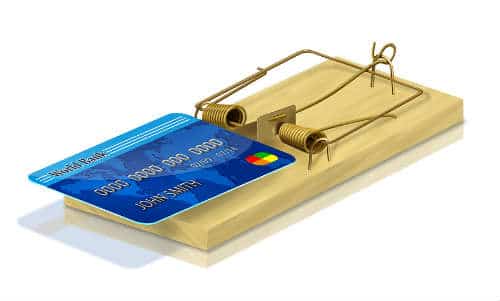The average American family owes $8,000 in credit card debt, according to the American Bankers Association. All together American consumers were carrying $2.564 trillion in total debt in January 2009, up 1.2% from December, reports the Federal Reserve.
We are a nation in deep debt, but there are some strategies you can take to help yourself out of your own personal debt.
Here are four tips for tackling credit card debt that will help raise your credit score.
Use tax refund to pay debt.
If you’re expecting a tax refund, apply it to pay down your credit card debt. It was money you didn’t have the day before so don’t use it on luxuries. If your refund can pay off any one of your credits cards in full, pay it off. It will be one less bill you’ll have to worry about. Paying off a card will also help raise your available credit, which, believe it or not, helps to raise your credit score.
Don’t close any accounts.
Even if you pay them off in full, even if they have a high interest rate, you still want to leave your accounts open. When you close out accounts, you hurt your FICO score in two ways. First, you decrease your available credit, which is used as a criteria in calculating your credit score. Also, you decrease the “average age” of your accounts, and cut off that past credit history. Remember, the longer a credit history you have, the more it works in your favor. 15% of your credit score is based on the length of your credit history.
Hide your cards.
Just because you leave an account open, that doesn’t mean you have to use the card to help your credit score. An open account is not the same as an active account. To avoid the temptation of using a credit card, put the card in the freezer, store it in a hiding place that’s hard and inconvenient to access, or go ahead and cut it up if you absolutely must. (I typically don‘t recommend cutting up cards as a general strategy, because the problem isn’t the cards, the problem is us, and our ability to control our spending!)
Choose card to pay off first.
I know this is going to sound like financial heresy, but there’s a huge problem with the age-old advice of “pay off high-interest rate debt first.” This strategy doesn’t work for most people, especially if your interest rates aren’t that high or if it will take only a small amount of money to pay off a different card and years to pay off the card with the highest interest rate.
The best strategy for knowing which card to tackle first is to know what’s really bugging you about your cards. Is it high balances, the sheer number of cards or the compounded interest rates? Tackle the source of your pain first so that psychologically you feel as if you’re making a dent on your debt so that you don’t just stop making payments, which could hurt your credit score even more.
To help you better choose which card to pay off first for yourself, see “Day 25 Pick a Proper Debt Payoff Strategy” in my book “Zero Debt: The Ultimate Guide to Financial Freedom.”










